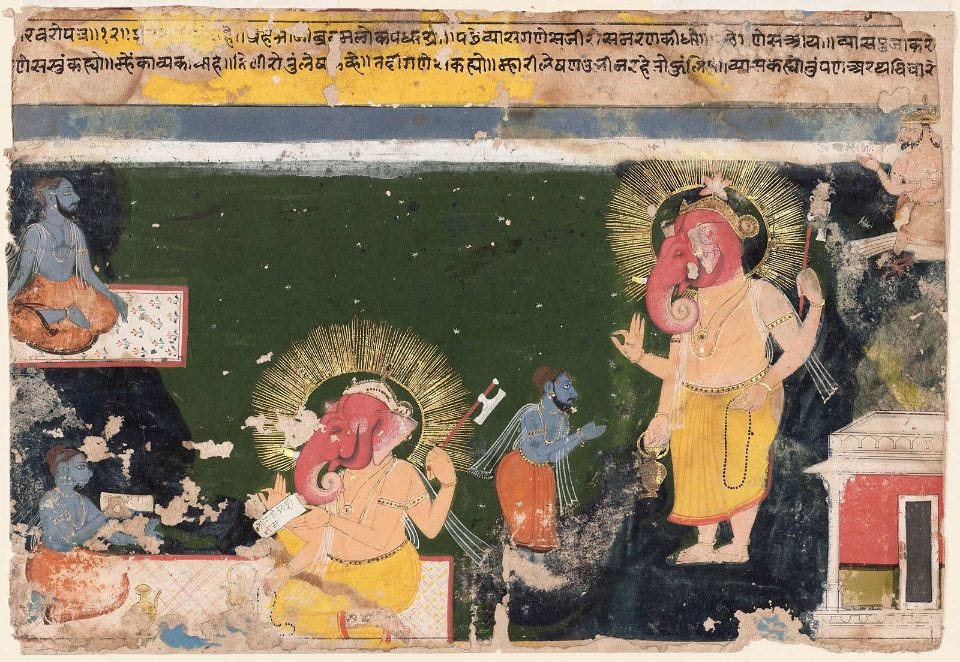Jayary Newsletter # 58

Swayamvara
Swayamvara. When a horde of kings descend on a fellow ruler's capital and joust with each other with the hope of winning his daughter's hand. Except, her choice is final. She has to approve of the winner. Even if it has elements of rams butting their heads against each other, it feels saner than some modern mating rituals. Then again, not everyone can afford a swayamvara. What happens to their daughters? Who fought over them?
Now that the gods have enlisted Nala as their agent, the screen credits start rolling. Damayanti's father calls for a swayamvara; kings from all over the land roll into town. Swayamvaras weren't peaceful. Draupadi's suitors were drunk or stoned most of the time. I am guessing the event is somewhere between a fete and an orgy; the kings drink and fight and wait for their turn at the contest, whatever it might be.
When all the kings are seated, Damayanti notices that there are five Nala clones: the man himself and the four gods he's representing. She doesn't know how to distinguish the original from the copy (sidenote: can a god ever be a fake?) when she remembers that the gods have no earthly markers. In the story of Sukanya, she weeds out her mortal husband from the Ashwin twins by noticing that two of the look-alikes leave no footprints. As we know, the gods don't blink either.
Damayanti chooses not to take the detective route. Instead, she takes the path of love: she's given herself fully to the king of the Nishada's. How can she spend her life with someone else? When the gods realise the extent of her devotion, they disclose themselves to her. Sometimes love reveals the truth; sometimes truth reveals itself to love.
The Matrix Made Flesh
I am still thinking about Damayanti's decision to choose Nala over one of the gods. Wait, that's not the only puzzling outcome: what about the gods being jealous of Nala's beauty and tricking him into becoming their representative. And before that, what about the gods desiring Damayanti. Why would an immortal desire a mortal, especially when there are plenty of desirable immortals? Why would a mortal, given a chance, not choose an immortal?
None of this makes sense to us. To the extent that we believe in God or gods, they're these infinitely powerful distant beings. Entirely not-human, out of this world, how can they ever find us attractive? We no longer accept the anthropomorphism of being the chosen species, but that's both a lighter and a heavier burden than Damayanti's. Lighter, because we don't have to fend off gods in addition to all the unwanted attention from humans. Damayanti's gods are not on earth but they are close by and constantly visiting us like powerful guests who overstay their welcome but can't be kicked out without incurring their wrath. In contrast, the one God is very very far away; in fact he's outside the universe altogether.
Our burden is heavier than Damayanti because the One God has chosen us. He's pointing a finger at us from his perch outside the universe: "I choose you." Forget the Sistine Chapel God who's a hair's breadth away from Adam; the only God who can choose us today is one who can denote: think of him as a pointer in C or some other programming language except that the program has escaped the confines of the computer and is speaking to us (from where? where do we hear him?). That's a pretty powerful God: the matrix made flesh. What would Damayanti do if she was desired by Him?
Death, Fate and Circumstance
Time is a constant presence in our lives but Time with a capital T is mercifully less so, for its invariably the bearer of bad news. Death, Fate and Circumstance; these are the three forms in which Time reveals itself to us.
Death is the far horizon that we can't even begin to understand; it's easier for me to imagine what it's like to be a bacterium or a bat than what it's like for me to be dead even as I know that it will greet me with open arms one day. Death is the black hole of language and perception for every thought that enters its grip is swallowed, never to be seen again.
Fate is the near horizon, the rishi's curse, the god's decree: immovable, impenetrable, it reduces to mere playthings. It was fate that lead Parikshit to decorate a meditating rishi with a snake. It was fate that led turned Devadatta into Bhishma. On the other side of Fate is Death, waiting patiently for it has all the time in the world. Parikshit built a great palace, he sacrificed to all the gods but death was waiting for him on the final day.
Then there's circumstance, which is like a jack-in-the-box, ready to spring upon us if the conditions are ripe; like Karna finding Duryodhana when his brothers reject him. Some events lie at the cusp of fate and circumstance. Yudhisthira's failure at the gambling table was circumstance, but once Draupadi was dragged into the Sabha, it became fate.
Kali and Dvapara are the keepers of fate as well as circumstance. They're upset with Damayanti for choosing a mortal over a god. The returning (and defeated) gods tell the timekeepers that the couple was married with their blessing but the two aren't in a mood to listen. They can't unleash fate against Damayanti since she didn't act against dharma, but they are going to create the circumstances in which Nala and Damayanti will rush headlong into fate on their own.
Still, the gap between fate and circumstance is large enough for hope to slip in between. It's a true test of character.


